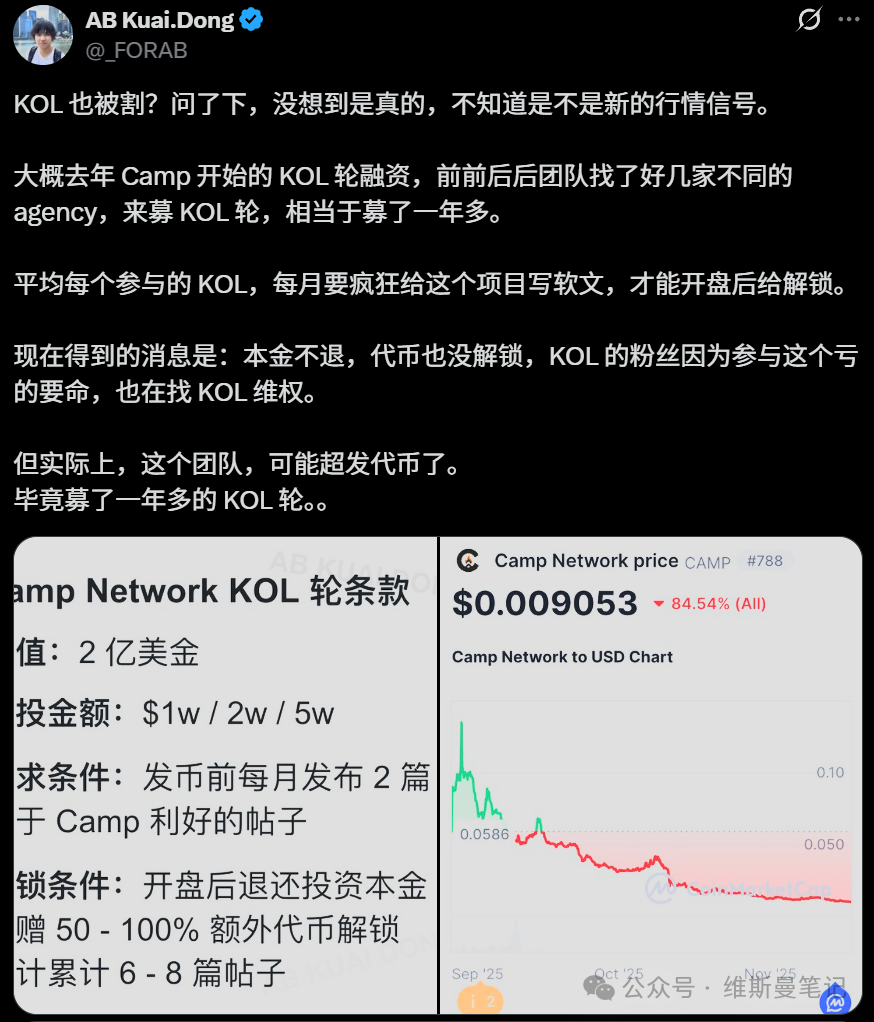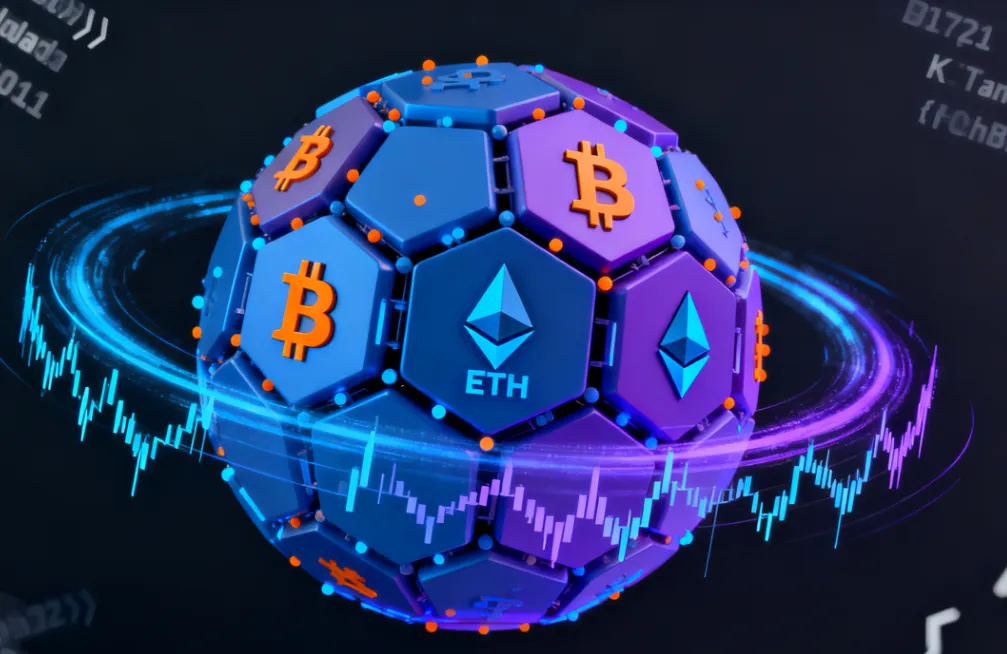Author: Liu Ye Jing Hong
Today, I want to start with some off-topic remarks, and also take the opportunity to thank the recent retweets from big influencers in the circle.
I personally have an X account, but I currently have no plans to seriously operate on X. This is not a spur-of-the-moment decision, but a choice made after careful consideration. Today's article will start from here and then move on to the main topic. I have been in this self-media space for several years, and the reader group is mostly old friends who have weathered several bull and bear markets together. Most of the followers have been reading my content for many years, so I won’t beat around the bush and will share some heartfelt thoughts.
Why I Don't Operate on X
To explain this question, I need to first discuss the monetization logic of Web3 KOLs.
From the perspective of individual KOLs, it is actually very difficult to monetize "only through content itself." From what I currently know and see, the only ones who can survive purely on content payments are a very few, like Liu Jiao Lian.
In my view, this circle can be roughly divided into two types of people:
Cryptocurrency traders
Web3 users
The first type, cryptocurrency traders, will not pay for "content," but will pay for "traffic." A typical case is posting hundreds of percentage points of returns on X or in public forums, then teaching you how to trade. I do not consider this content payment; it is essentially using screenshots of returns to attract traffic, then converting and harvesting.
The second type is Web3 users, who may be practitioners/entrepreneurs or genuinely have complete ideas about Web3 and are willing to think deeply. This type of user will indeed pay for quality content, but the proportion is very small. In the entire cryptocurrency traffic, after excluding various inflated numbers, I subjectively estimate that this group may be less than 20%.
More critically:
This group of people has a common characteristic—they think for themselves.
The more someone thinks for themselves, the harder it is to use simple marketing language to get them to spend money. This difficulty is far greater than "convincing a group of people who only want to trade cryptocurrencies to join a paid group." Therefore, if I were to pursue "content monetization" for the sake of X's large traffic, the appeal for me is not significant.
The Most Common Monetization Method for KOLs: Promotion
In addition to content payment, the more common monetization method for KOLs now is various promotions.
From single soft advertisements, product promotion tweets, to so-called KOL agency joint promotions, they are essentially serving the client. In most industries, this business logic is reasonable and legal. But this is the cryptocurrency circle—a place where "fraud" can be packaged as "narrative."
I personally do not want to take on too many uncertain legal and ethical risks for money, nor do I want to end up "stranded in a foreign land" because of a few promotions. So over the years, I have basically not participated in such promotions. To be more realistic, these promotions are not guaranteed to be profitable; the probability of stepping on a landmine and losing money is not small.

Moreover, the current Web3 KOLs have been completely industrialized.
Several MCN agencies are now mass-producing Web3 KOLs:
They post content in bulk on X, Xiaohongshu, and Douyin to drive traffic, then collect people into private domains and convert them uniformly—some sell courses, some offer commissions, and some directly induce buying cryptocurrencies. My self-media does not engage in any of these operations, so I do not consider myself a "KOL."
I am more like a self-media author who writes some insights in the circle and occasionally shares my views, nothing more. In the past two years, my main focus has actually been on "incubation and services related to production research." Below, I will share some personal experiences in this area, which are very subjective and may differ completely from your understanding. If you disagree, that’s normal because everyone’s path is inherently different.
Experience One: Use "Reverse Thinking" to Make Money
I consider myself half a product manager, and in the process of work and collaboration, I have seen a very common pattern:
Most people's starting point is:
"I have a good idea → Turn the idea into a product or service → Then find users, sell it, and scale up." From the perspective of "product methodology," this certainly has its merits. But if viewed solely from the angle of "making money," I prefer to use reverse thinking:
First, clarify: Whose money do I want to earn?
→ Then design products and services around these "willing to spend people,"
rather than making something first and then looking for users everywhere. In the projects I have collaborated on, some have failed, while others have made money.
Last year, I worked with a team on a business related to RWA, and their logic was very clear: they had a batch of assets with clear buyers.
Buyers needed compliant and legal RWA solutions.
Therefore, they deduced that they needed to create an RWA project to meet this "already existing demand."
This is a standard "buyers first, products later" approach.
However, I see more projects like this:
No clear buyer profile and no real demand.
Constantly chasing market trends, changing stories, and restarting hype.
Hoping to catch a few "stray fish" from the public traffic in the cryptocurrency circle.
In my view, the uncertainty here is enormous.
The probability of project failure is already over half from the start. To give another specific example of how "reverse thinking can help make money":
Previously, I collaborated with a friend on a content-related project, where I was responsible for providing a batch of high-quality content.
His logic was very simple and realistic: he had a batch of real Solana community resources (both domestic and international).
He had already connected with various community mods, allowing him to post content in groups without being kicked out.
I was responsible for producing a batch of quality content to be placed in these real communities.
Naturally, some people in the community would be attracted by the content and reach out to me privately.
He would then guide these people into a new community for secondary engagement.
When the meme market exploded, he inserted a CA into this already "filtered" new group to encourage everyone to jump in.
It turned out that he indeed made a lot of money during this pump.fun craze.
The key to this case is:
He first had buyers: a batch of real, reachable user communities.
Then he sought my services: high-quality content suitable for these users.
Only then did monetization come into play.
Why do I think "reverse thinking for making money" is more likely to succeed?
This leads to my second experience.
Experience Two: First Clarify "Sunk Costs"
In the money-making arena, "ideas" are the least valuable asset.
Everyone has their own ideas and paths for making money. An idea you can think of, someone else can likely think of too, or even think of it earlier and more maturely. So the question arises: when everyone has ideas, what can break the deadlock?
The answer is: execution.
Many people have ideas, but very few actually execute them.
The vast majority of people remain at the stage of "watching others make money," and when it comes to taking action themselves, they often choose a "safer" route: franchising.
They hope to leverage external forces to skip the execution costs of starting from scratch. The result is:
They hand over the most important supply chain capabilities and pricing power to others,
ultimately becoming the kind of "franchise pitfalls" we often see in the news. This example illustrates two things:
Execution is scarce.
Execution is fundamentally constrained by "costs."
Why do so many people prefer to pay franchise fees rather than start from scratch?
Because execution comes with costs: learning costs (like understanding the supply chain).
Communication costs (connecting with suppliers, managing employees, and dealing with property management).
Time and energy costs (you have to actually be in the store, not just be a hands-off manager).
I refer to all of these as: sunk costs.
And execution is what gets "stuck" by sunk costs. So, when you really plan to start a business or do something, I believe your starting point is mostly to make money. Therefore, before taking action, there is a very important sequence:
First assess what sunk costs I need to bear? Time, money, connections, energy, reputation, and various dimensions of costs. Can I bear these costs even if I lose everything, step on a landmine, or mess up?
If you believe the sunk costs are acceptable, then consider: with your current resources, capabilities, and manpower, do you have a chance to do this well?
Only then can you think about whether you can add your own "creativity and ideas" to this business logic to create differentiation.
If the sequence is wrong, it can easily turn into:
Idea → Passionate excitement → Start execution → Midway discover costs are unbearable → Give up halfway
Not only do you not make money, but you also put yourself in a dilemma.
Conclusion
If we treat the cryptocurrency circle as a giant casino, then most people are discussing "how to play cards" every day.
Very few people seriously think: Who opened this casino?
Who designed the chips?
Who wrote the rules?
And oneself, are they a player or a chip?
Not operating on X and not actively engaging in traffic games is just a choice for me:
I prefer to spend my time on projects that serve real needs and interact with those who are willing to think for themselves and pay for value. If you happen to be thinking about how to make money, start a business, or transition in this industry,
I hope you at least remember two things: first find "buyers," then make products.
Don’t expect to catch "stray fish" from public traffic; that’s a game for KOLs and agencies, not for ordinary people. First calculate "sunk costs," then discuss execution and creativity.
Costs that cannot be borne, no matter how beautiful the idea, are an illusion. As for how to find your own batch of "buyers" and how to assess the sunk costs you can bear,
Perhaps I will have the opportunity to write about it slowly in the future.
免责声明:本文章仅代表作者个人观点,不代表本平台的立场和观点。本文章仅供信息分享,不构成对任何人的任何投资建议。用户与作者之间的任何争议,与本平台无关。如网页中刊载的文章或图片涉及侵权,请提供相关的权利证明和身份证明发送邮件到support@aicoin.com,本平台相关工作人员将会进行核查。




